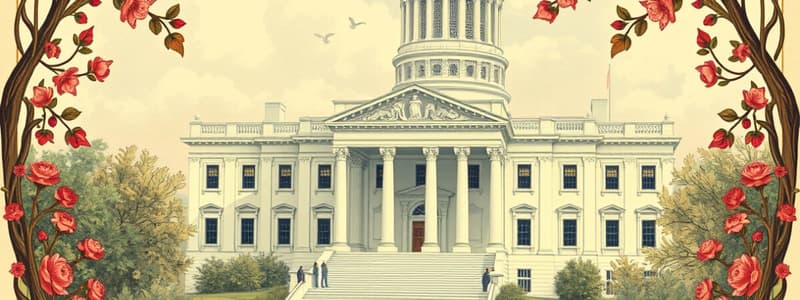Podcast
Questions and Answers
Which statement reflects Thomas Gibbon's view of interstate commerce?
Which statement reflects Thomas Gibbon's view of interstate commerce?
- The federal government should have power over interstate commerce. (correct)
- The state government should have power over interstate commerce.
- There should be no regulation of interstate commerce.
- Only local governments should regulate interstate commerce.
Which individual freedom is protected under the Constitution?
Which individual freedom is protected under the Constitution?
The freedom to assemble together for peaceful meetings.
The powers of the commander in chief of the armed forces belong to the?
The powers of the commander in chief of the armed forces belong to the?
Executive branch.
Why is the Supremacy Clause considered to be 'the root of federalism'?
Why is the Supremacy Clause considered to be 'the root of federalism'?
The Judiciary Act of 1789 gave powers to the judicial branch that went beyond what the Constitution outlined. What was the outcome of this?
The Judiciary Act of 1789 gave powers to the judicial branch that went beyond what the Constitution outlined. What was the outcome of this?
What inference can be drawn from the Supremacy Clause?
What inference can be drawn from the Supremacy Clause?
Which would most likely fall under appellate jurisdiction?
Which would most likely fall under appellate jurisdiction?
An important part of Article VI in the Constitution is the?
An important part of Article VI in the Constitution is the?
Who appoints Supreme Court justices?
Who appoints Supreme Court justices?
The Constitution limits the executive branch from declaring war by giving that power to?
The Constitution limits the executive branch from declaring war by giving that power to?
According to Article I, Section 2 of the Constitution, each representative must?
According to Article I, Section 2 of the Constitution, each representative must?
What was the first step in approving the Constitution?
What was the first step in approving the Constitution?
A state refusing to follow a federal law would be guilty of?
A state refusing to follow a federal law would be guilty of?
What does original jurisdiction refer to?
What does original jurisdiction refer to?
Which of these powers are under the control of the states?
Which of these powers are under the control of the states?
Flashcards are hidden until you start studying
Study Notes
Interstate Commerce
- Thomas Gibbon believed that the federal government should have authority over interstate commerce.
Constitutional Freedoms
- The Constitution protects the freedom of assembly, allowing individuals to gather peacefully for meetings.
Commander in Chief
- The role of the commander in chief of the armed forces is designated to the executive branch of the government.
Supremacy Clause
- The Supremacy Clause outlines the hierarchy of laws, indicating the relationship between federal and state powers, which is foundational to federalism.
Judiciary Act of 1789
- The Judiciary Act of 1789 exceeded constitutional authority, leading to its ruling as unconstitutional by the courts.
Federal Law Supremacy
- An inference from the Supremacy Clause indicates that federal laws take precedence over state laws.
Appellate Jurisdiction
- Appellate jurisdiction typically involves cases that have been appealed from lower courts.
Article VI
- A significant component of Article VI is the Supremacy Clause, which asserts federal law's primacy.
Appointment of Justices
- Supreme Court justices are appointed by the president of the United States.
War Powers
- The Constitution restricts the executive branch from declaring war, reserving this power for the legislative branch.
Age Requirement for Representatives
- Per Article I, Section 2, representatives in Congress must be at least 25 years of age.
Ratification Process
- The first step in the Constitution's approval required it to be sent to individual states for consideration.
Federal Law Compliance
- States that refuse to comply with federal laws are in violation of the Supremacy Clause.
Original Jurisdiction
- Original jurisdiction grants the Supreme Court the authority to hear a case for the first time, rather than on appeal.
State Powers
- Powers typically controlled by states include the establishment and management of school systems.
Studying That Suits You
Use AI to generate personalized quizzes and flashcards to suit your learning preferences.




